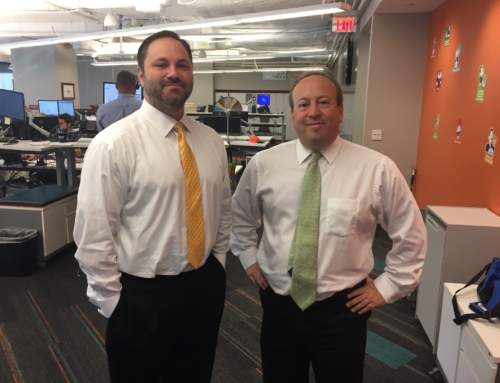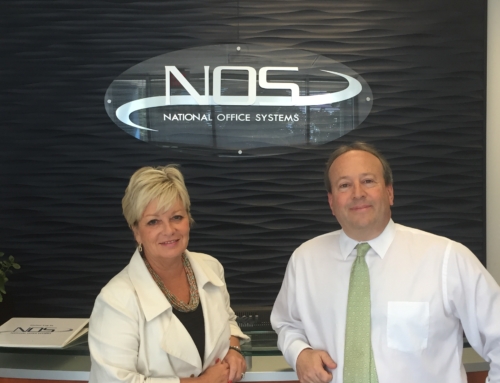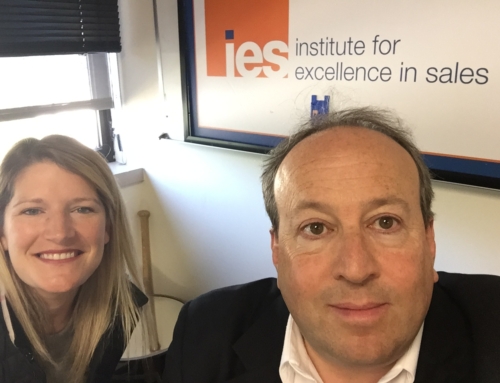By Fred Diamond, IES Executive Director
Earlier this week, the news channels spent hours of programming discussing perceived lies President Trump might have made about calls he may or may not have received from the president of Mexico and the head of the Boy Scouts of America. Last month, President Trump said on Fox News that he didn’t tape former FBI Director James Comey when they met earlier this year although he insinuated on Twitter that he had taped the conversation. On the newscast, he admitted that he hadn’t but that it was a good thing he said that he had because he felt that the deception had caused Comey to temper his testimony. Trump claimed this as a victory. Almost concurrently, National Geographic ran a cover story on “Why We Lie.” All the talk about prevarication got me thinking, “Is Lying the New Black in…Professional Sales.” Should we admit that it’s okay to lie in sales?
First of all, this is not a political commentary, just a reflection on the times. If you want political commentary, check out all the posts from my Facebook friends.
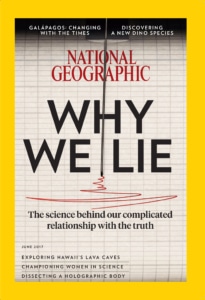 Now, it’s pretty easy to say of course there’s lying in professional sales. Every sales rep who has sold a product that had not been released yet is stretching the truth at some level. Until those new features are truly available in the finished, commercially available product, there is some degree of hope that is going on, which might be interpreted as lying. But with the over the top, ubiquitous commitment to lying at the highest levels in our society these days, is this a good thing in professional sales?
Now, it’s pretty easy to say of course there’s lying in professional sales. Every sales rep who has sold a product that had not been released yet is stretching the truth at some level. Until those new features are truly available in the finished, commercially available product, there is some degree of hope that is going on, which might be interpreted as lying. But with the over the top, ubiquitous commitment to lying at the highest levels in our society these days, is this a good thing in professional sales?
The IES deals with the top sales trainers, speakers and thought leaders in the world. I polled a few to get their feeling if it’s finally in vogue to acknowledge that full-out lying is indeed acceptable in professional selling. Although some of the thought leaders you’ll see below clearly believe that lying has no place in professional selling, some have acknowledged that lying is acceptable, at some level. Let’s see.
THE GOAL IS FORESHADOWING HONESTY
Steven Gaffney has made a name for himself as the honest communications speaker and author. He writes and speaks all over the world on how organizations should be proactively practicing honesty. I expected him to be adamant that 100 percent honesty is a requirement, but he wasn’t and acknowledged to me that it’s not always reasonable to offer complete honesty.
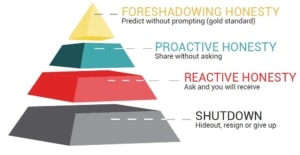 He did say, however, that organizations should strive for the state of foreshadowing honesty. In this state, which is at the pinnacle of his Honesty Pyramid (see graphic), organizations can get ahead of potential problems and thereby create future opportunities that otherwise wouldn’t exist by sharing possible problems that might emerge.
He did say, however, that organizations should strive for the state of foreshadowing honesty. In this state, which is at the pinnacle of his Honesty Pyramid (see graphic), organizations can get ahead of potential problems and thereby create future opportunities that otherwise wouldn’t exist by sharing possible problems that might emerge.
“Even if there’s currently nothing wrong with a prospect relationship, foreshadowing honesty enables organizations to get ahead of potential problems – and create future opportunities that otherwise wouldn’t exist.”
THE AUTHOR OF HONESTY SELLS IS STEADFAST ABOUT HONESTY
Colleen Francis is one of our favorite sales experts. We frequently give copies of her fantastic Non-Stop Sales Boom to new IES members. When we posed the question to her – Is lying the new black in professional selling? – her take was pretty hardline.
“There is no excuse for lying in sales. It’s an ill-advised short term strategy used to try and get a prospect’s attention and business but it always ends up with buyers discovering the truth,” she told me. She reminded me that the news is rife with reminders of this reality: Wells Fargo, VW, Samsung, Enron, Nortel and WorldCom, for example. In each case, she reminded me, the truth came out. Sometimes it took a while, but it happened. And when it did all business was lost.
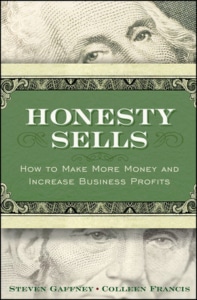 “You can probably think of your own cast of characters famous for lying and withholding. Thanks to social media it doesn’t take as long as it used to for your buyers, and potentially the world to find out about your dishonesty. And today, the potential damage from lying is greater than in the past. Once trust has been lost, it is difficult to reestablish it, and business and potential business will be lost forever,” she postulated.
“You can probably think of your own cast of characters famous for lying and withholding. Thanks to social media it doesn’t take as long as it used to for your buyers, and potentially the world to find out about your dishonesty. And today, the potential damage from lying is greater than in the past. Once trust has been lost, it is difficult to reestablish it, and business and potential business will be lost forever,” she postulated.
Colleen said she was worried that lying appears to be on the way up.
“Why does it seem that lying is on the increase? In the last month alone I’ve personally experienced sellers:
- From the UK call and tell my office manager Casey that he just missed a call from me, when he in fact did not.
- Emailing me to follow up on our last conversation, that never happened.
- Leaving voice mails on my line or cell phone saying they are returning my call, which I never made.
- Sending me email proposals based on conversations we never had
- Call to tell me that they were referred to me by the President of an Association I don’t belong to.
Fred, please stop the insanity, she begged.
“When Steven Gaffney and I wrote Honesty Sells, we started with the premise that overt lying wasn’t a problem in sales anymore. We had some fun in chapter 1 and highlighted sellers in the “Sales Hall of Shame” who had blatantly used lies to try and win business, but enough is enough. Just don’t do it.”
THE SALES HUNTER’S TAKE
Mark Hunter, “The Sales Hunter,” is an IES favorite. His High-Profit Prospecting was a huge hit at our 2016 Customer Acquisition Symposium. He was also pretty clear on his stance.
“Fred, the only viable strategy for any salesperson is to sell with integrity. I like to say when you prospect with integrity; you will get clients who have integrity. Salespeople may be tempted to lie to advance a sale, but doing so not only puts their personal character at risk, but also their company culture and bottom-line,” he said.
He continued, “Customers are smart and they know when a salesperson is blowing smoke. What I’ve found time and time again is the salesperson who is willing to lie is going to attract customers who don’t have an issue with that. We tend to attract people who behave like us, so if you want customers who lack integrity, all you need to do is lack integrity in yourself. Just don’t be surprised when these low standards erode any success you are trying to achieve.
HIS COMPANY IS CALLED SALES INTEGRITY. IS THAT AN OXYMORON?
Sean Piket, Founder & CEO of Sales Integrity LLC (appropriate sales leader to ask) was also emphatic in his answer.
“My answer is short and simple – no. Back in 2004 when I launched my business I named my company Sales Integrity to combat the negative connotation the words “sales” and “selling” had in society upon first hearing it,” he said. “In the early days, when I met people at networking events or in business meetings and told them my company name is “Sales Integrity”, I typically received the same response – “Isn’t that an oxymoron? Can you have integrity and be in the sales profession?”
Sean said that response opened up the conversation and allowed him to personally demonstrate professionalism as it relates to selling to change the very image many had of the sales profession. He also said that he has seen a major shift in how sales professionals go about their work today.
“I rarely receive that same response in today’s modern selling world. Part of having integrity and being a sales “professional” is always doing the right thing for all parties involved and doing that right thing the right way,” he said. “The right way is always to be truthful and not to mislead your prospects or customers at any time in the sales process, no matter how easy it might be to do. This gets back to the core definition of integrity – doing the right thing when no one is looking.”
He continued, “Being truthful, forthright and honest is always the right way and many of today’s modern sales professionals would achieve a higher level of success in the long run of their career by heeding this advice. The truth always comes out in the end, no matter how long it takes. So you might as well lead with it and maintain it throughout the entire sales process.”
Sean had a specific example to share.
“Being a CEO of a company, I am approached by numerous salespeople on any given week. This exposes me to the “other side” of selling, allowing me to see firsthand what’s going on in the field of selling outside of the sales professionals and leaders whom I coach. Recently, a sales rep selling software reached out to one of my employees who is no longer with my company. Given that, the sales rep received an auto-reply email stating the former employee was no longer with the company and that all inquiries should be directed to me. Well, this sales professional took some liberties (i.e. attempted to mislead me) while reaching out to me by including in his email subject line the words “Referred by (Former Employee’s Name)”. Then he went further by opening up his email by stating “(Former Employee’s Name) referred me to you to discuss a possible integration of our software product into your platform.”
Upon first glance some might think this sales professional was being creative or clever in attempting to get my attention. It got my attention alright, only the wrong kind of attention. My first thought was “If he is misleading me right up front in the sales process then how can I ever trust this guy if I do decide to engage with him to evaluate his software?”
Sean concluded, “Misleading your prospects is never the right way to start off a relationship. It will end badly, if it even begins.”
What do you think? Is lying the new black in sales? Is it a good strategy? Have the times changed where it’s now in vogue to lie? Let us know.




